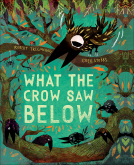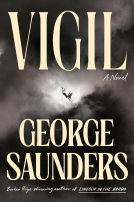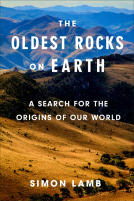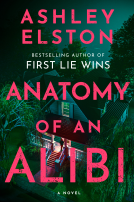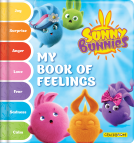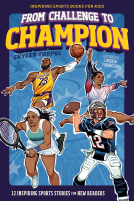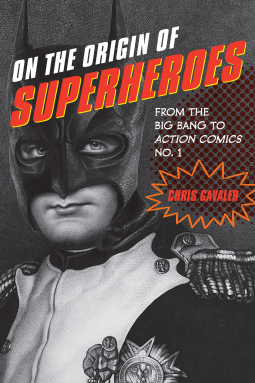
On the Origin of Superheroes
From the Big Bang to Action Comics No. 1
by Chris Gavaler
This title was previously available on NetGalley and is now archived.
Send NetGalley books directly to your Kindle or Kindle app
1
To read on a Kindle or Kindle app, please add kindle@netgalley.com as an approved email address to receive files in your Amazon account. Click here for step-by-step instructions.
2
Also find your Kindle email address within your Amazon account, and enter it here.
Pub Date Nov 01 2015 | Archive Date Dec 01 2015
University of Iowa Press | University Of Iowa Press
Description
From the creation of the universe, through mythological heroes and gods, to folklore, ancient philosophy, revolutionary manifestos, discarded scientific theories, and gothic monsters, the sweep and scale of the superhero's origin story is truly epic. We will travel from Jane Austen's Bath to Edgar Rice Burroughs's Mars to Owen Wister's Wyoming, with some surprising stops along the way. We'll meet mad scientists, Napoleonic dictators, costumed murderers, diabolical madmen, blackmailers, pirates, Wild West outlaws, eugenicists, the KKK, Victorian do-gooders, detectives, aliens, vampires, and pulp vigilantes (to name just a few). Chris Gavaler is your tour guide through this fascinating, sometimes dark, often funny, but always surprising prehistory of the most popular figure in pop culture today. In a way, superheroes have always been with us: they are a fossil record of our greatest aspirations and our worst fears and failings.
Advance Praise
“I’ve been reading superhero comics my whole life and this book made me realize I’d never known what they were. This is the book that reveals Superman’s strange cultural DNA and the dark prehistory that shadows Action Comics No. 1.” —Austin Grossman, author, Soon I Will Be Invincible
“Superheroes are everywhere now, but Gavaler shows that that’s nothing new. From Zeus to Zorro, he looks at why we love the superhero, and why maybe sometimes we shouldn’t. Eclectic, entertaining, and surprisingly personal, On the Origin of Superheroes will grant new super-knowledge to scholars, fans, and casual readers alike.”—Noah Berlatsky, author, Wonder Woman: Bondage and Feminism in the Marston/Peter Comics, 1941–1948
“Chris Gavaler has permanently changed the way I think about the emergence of the superhero and bridges the frontier that divides proto-superheroes from superheroes. He innovatively traces the prehistory of the superhero, demonstrating that the superhero’s roots are planted in the soil of myth and legend and watered by the philosophy of the übermensch with eugenics as fertilizer. The surprising connections that emerge throughout kept me constantly wondering what was going to come next and made the book feel like a detective story.”—Peter Coogan, author, Superhero: The Secret Origin of a Genre
Available Editions
| EDITION | Paperback |
| ISBN | 9781609383817 |
| PRICE | $18.00 (USD) |
Links
Average rating from 24 members
Featured Reviews
 Janine A, Reviewer
Janine A, Reviewer
I'm still fairly new to the ever expanding universe of comic books and their culture, but Gavaler's take on the superheroes of the genre is simply amazing! 'On the Origin of Superheroes: From the Big Bang to Action Comics No. 1' delivers exactly what the title promises: Gavaler reconstructs the roots of the superhero archetype which Action Comics No. 1 gave to us in 1938. The most different influences from mythology, literature, philosophy, history and pop culture mix with reflections on the two most prominent superheroes – Batman and Superman – and are backed up with personal anecdotes from Gavaler. It's a great strength of his to make his arguments easy to follow, especially because he isn't necessarly working through them in a periodic order, and explain the connections between everything in a simple and logical way. There's for example a lot of name dropping happening of course but Gavaler takes the time to explain roughly backstories or movie scenes, and makes me want to check out these things on my own later on instead of discouraging the reader. The way this book is written, I wouldn't immediately believe it to be a non-fiction book published by a University press... but this is the way I actually love scholarly books: well researched and presented in a way that non-scholars also can pick them up! Personally, I wouldn't mind to read another work of Gavaler following the next few decades of superheroes but for now his blog will do as well! Even if one isn't interested in superheroes or comics per se is 'On the Origin of Superheroes: From the Big Bang to Action Comics No. 1' alone for the complex interweaving of different cultural aspects with pop culture a must read for anyone interested in this subject – and comic book lovers will definitely enjoy it too!
 Bill C, Reviewer
Bill C, Reviewer
On the Origin of Superheroes by Chris Gavaler
When most people discuss the origin of the superhero, they typically start with Action Comics 1 and the introduction of Superman. Some might go back a few years to characters like Doc Savage, quickly naming a few pulp heroes along with Doc, but then they too dive almost immediately into that same issue with Superman lifting the car. Where most people begin, however, is where Chris Gaveler ends in his in-depth look at the long road that led to Action Comics 1 and the universe it spawned. And a long road it is indeed in Gaveler's telling, even if it doesn't quite start at the Big Bang as the subtitle to On the Origin of Superheroes hints. Gavaler's definition of superhero is sometimes a bit broad and all-encompassing for me, and at times he generalizes past my own comfort point, but this is an informative and wide-ranging look at the fertile ground from which the concept of a superhero sprouted, ranging across centuries and genres and my guess is that most readers will find lots of new names and characters and find some superhero lineage they hadn't considered, even if they end up not wholly agreeing with the connecting lines Gaveler draws.
He begins with asking the basic question just who/what is a superhero, running through various ways that question has been answered in the past. Tracing the actual usage of the specific word itself, "superhero", he moves farther back in time, from those aforementioned pulp heroes to Nietzche. Dropping the term and going by "type" he continues back to mid-nineteenth century penny dreadfuls, the American West, then back to the American and French Revolutions, Guy Fawkes and Cromwell and Napoleon, to Faust and Frankenstein and back back back to Genesis and Hercules and Gilgamesh. So no, not quite to the Big Bang, but from his beginning point in the Lascaux caves and then to mythologies both Eastern and Western, we're a long ways away from the Big Blue Boy Scout's debut.
Gaveral, as he tells us though, isn't happy with "ancients cavorting with my hard-earnedspandex-wearers," making a distinction between gods and superheroes:
Superheroes aren't just gods drawn down to human form. Superheroes raise humans up to the miraculous. A magic word a blast of radiation ... and some earthly nobody is transcending earthly limitations. That's way more heroic than some all-powerful being dropping down to slum with his mud-born worshippers ... superheroes bridge the divine-mundane chasm with their own both/neither category as mortal deities. By combining heaven and earth, they create a third sphere that flips the hierarchy ... they prefer their "mensch" over their "uber". They are humans who become gods but then choose to be human.
This chapter discussion spins into a look at a range of character and works and philosophies, from the Bible to Milton's Paradise Lost to Robert Sullivan and Chris Slane s Maui" Legends of the Outcast to Batman and George Bush and Glenn Greenwald to Jesus, Adam Warlock, and Thomas Jefferson, to just name a few. This wildly discursive approach, which continues throughout the book has its plusses and minuses.
On the one hand, it's a stimulating task to follow all these connections amongst what on the surface seem wholly or partially disparate topics as Gaveral weaves together artistic, sociological, and cultural elements. To admittedly varied success depending on one's point of view, but I found that even when he made a leap that seemed too far or too soft for me (I wrote "seems a stretch" more than once in the margins, as for instance when in a later chapter he references Hester Prynne), he always had me thinking. Sometimes about the arrival of what would become a character trait in superheroes, sometimes about what would become a superhero trope, such as the secret identity or its subset, the "unmasking," a trope he connects with Jean Valjean's moment of revealing himself in order to save a man pinned by a wagon. I don't need to always agree with an author, but I do need to feel like I'm being made to think when I'm reading non-fiction.
The downsides to the jumping around style is that the shifts aren't always fluid, the jumping can at times seem a bit frenetic, the connections are sometimes more on a surface level than a substantive ones as he has a bit of linguistic fun that distracts more than it informs, and on a few very rare occasions, the linkages seemed to trivialize topics a bit. One example is in an extended thread on eugenics (an appropriate topic for any work considering supermen), when he tells us that the Virginia legislature is only now considering paying reparations to forced sterilization victims of its "Death Eater history ... imagine living your muggle life under the reign of Voldemort." Now, I don't for a moment think the author hasn't earned his linkage between eugenics programs, Hitler, and superheroes, but such a direct conflation seems an unfortunate choice to me when discussing real-life tragedies, even if his point, which he makes clearly, is that supervillains don't exist solely, or even mostly, in comic books.
Not everything is as well-earned as that eugenics link, though most is. And the constant zig-zag was at times less effective than it could have, while the attempts at cuteness more often were a distraction than an enhancement. But Gaveral writes with a sense of knowledge and authority, and usually as well with a sense of clarity and ease marred only occasionally by some clumsy constructions. And if you find some of his his mid-chronology connections a bit tenuous or overstated, as he moves nearer and nearer to that defining moment of Action Comics, his linkages become more and more concrete, especially as he examines the pulp era that came just before (I especially liked his segments on female pulp heroes). But those earlier sections, even the ones where I thought he was stretching things a bit, are in their own way more a provocation in terms of thinking, as they are less familiar, less concrete, and so force the reader to broaden their own viewpoint, even if they might eventually circle back to it (or not, as was sometimes the case; he certainly won me over more than once to his perspective).
On the Origin of Superheroes is one of the more original examinations of the genre I've come across and is worth reading for that alone, though certainly the substance of the text also makes it work recommending. As an added bonus, the book comes with an excellent bibliography for those looking to delve even deeper into the topic. An excellent resource and a provocative and stimulating read.
A fantastic overview of the literary and cultural history that has led us to our superhero obsession. Though it is written by a scholar for an academic press, the writing is refreshingly non-academic and completely jargon-free. Gavaler's research is meticulous and his love for the genre is apparent, though it certainly doesn't cloud his vision as he examines the morally questionable origins of our vigilante "heroes." I found so many fascinating insights, I think I may have underlined at least half of the text.
 Debbie L, Reviewer
Debbie L, Reviewer
This is a bit of a hard book to review because it was not what I expected, yet at the same time, exactly what it purported to be. This is an academic work and is therefore a bit denser than most people are used to. I admit that I had to remind my brain about how to read an academic work, which is prone to throwing many different names at the reader with very little context, as opposed to even a pop non-fiction book. This took several chapters before I got my brain back into academic mode.
That said, this was a super interesting book that followed superhero tropes through human storytelling history. Given the title, I guess I had expected more actual superheroes in the narrative. Instead, Gavaler explored the figures that preceded the superheroes that appeared in the comic books of DC and Marvel etc. These included mythological/religious figures, historical icons, and the heroes of old Westerns and noir pulps. At the same time, he placed superheroes into political, cultural, and social contexts, sometimes in ways that made me uncomfortable to be such a huge fan of fictional characters with roots in eugenics and white supremacy.
It was a fairly quick read for an academic work--much quicker than I remember some of my old history textbooks from college to be. And Gavaler was obviously as much of a superhero nerd as I was, making quick asides that were phrased to be an in-joke, a quiet nod to his fellow nerds.
That said, it is still an academic work and fairly dense. Some may find it a boring slog, in fact, when they were expecting something more light-hearted based on the subject matter. I also wish that Gavaler had slowed down and given a bit more backstory sometimes to the figures he threw at the reader. This was less of a problem later on in the book, but earlier when he was writing about mythological and historical figures, he could have provided more background, particularly since some of the figures he discussed were very obscure.
Second, he seemed to assume that the reader was familiar with current superheroes and their stories, and would casually mention Magneto, or the Dark Phoenix saga with no context of their relevance. If the reader was a comic book nerd, this is not a problem. But an unsuspecting reader who has only a passing familiarity with superheroes and comic books would have probably been at least a bit confused and lost. This was a problem throughout the book. It may seem odd to consider that there is anybody alive who doesn't know Batman has a sidekick named Robin, but I'm sure that person is out there (though he or she would probably not pick up this book, so perhaps this point of criticism is moot).
Third, I felt that despite his great scholarship and analysis, Gavaler skirted around a critical question of, "Why superheroes?" Why are we fascinated by them and love them? And why did they see a resurgence and unprecedented rise in popularity recently?
 Linda S, Librarian
Linda S, Librarian
On the Origin of SuperHeroes is a surprisingly fun and witty book written by a college professor and filled with anecdotes and facts about the HISTORY of superheroes. The author, Chris Gavaler, is an assistant professor of English at Washington and Lee University. He is clearly intrigued by the subject and has written several essays about SuperHeroes as well as having taught a seminar on the subject for several years.
This book is academic in nature – with an extensive bibliography and numerous references to literary works. For example, in chapters on Monsters or on Cowboys and Indians, there are comments on works by Wordsworth, Poe and Jane Austen, as well as on the characters of Clark Kent or the Sandman. Gavaler has much to teach about the literary and cultural foundations of superheroes. Throughout, I especially enjoyed the tone of On the Origin of SuperHeroes. As one reviewer said, “It's like having a conversation with a cool professor.
 Librarian 247951
Librarian 247951
A fantastic overview of the origins of superheros, including the literary and cultural foundations of superheroes. This title isn't your typical book on superheros, and it is very refreshing.
 Jim M, Reviewer
Jim M, Reviewer
originThis is a fascinating chronicle of the history of the superhero. I had no idea that by the time Superman came around, "superhero" had been in the vernacular for decades.
I mean, if you think that superheroes started in the 1930s and 40s with Superman and Batman, you're a little bit off. Almost 20,000 years off. Since people have been communicating and telling stories, there have been superheroes. Chris Gavaler walks us through the last several millennia, discussing who these superheroes are, where they come from, why they're here, and how they've evolved.
But this book had a different structure than I imagined. I thought it would be merely a history of fictional characters that fit the superhero mold of the twentieth and twenty-first centuries. But it's much more than that. It also places these heroes within the context of their environment and history and discusses the social issues that they encounter, fought against, or were oppressed by. It places these "super"heroes and "super"villains within their political and social context.
I guess it makes sense if you think about it, but there's a surprising amount of theology in this book.
And superheroes are so political! So many seem to have been created in the cause of revolution. What is a superman? Are they fascist in adherence to carrying out a code that other people, or the government don't agree with? We realize that there's always been a gray area our (super) heroes operate in. Subverting authority and revolution always have two sides. Each are equally supported and vilified. Which is right?
Gavaler also teaches us that sometimes we need to fabricate our villains that produce the superheroes. The Native American were a people that we oppressed, but we hid that fact by building up American superheroes and making the indigenous peoples supervillains. He then compares that frontier to the digital one on the Internet. Though he doesn't spend enough time contrasting them, I don't think. But while he doesn't contrast the heroes and villains of the western frontier against he those of the digital as well as I'd like, he doesn't pull many punches in, discussing the poor use of the Native American in pop culture - both in comics and movies.
Also fascinating are the roots of superheroes you see in gothic monsters. Batman anyone? This is even where Morpheus got his start; though as a Der Sandmann, a 17th century fairy that kidnapped sleeping children as food for his own children.
He also discusses evolution, and what our future holds. Should we be afraid of an advanced race? Of robots that we've created? And it's not all wild speculation. Will these future beings be "our descendants or our conquerors?" Included in this chapter is the obligatory discussion of duality. But under the umbrella of evolution it takes a different tone that I haven't read about before. And eugenics! I had no idea that at the turn of the century (around 1900) there were organizations established to prevent "improper" breeding! That's scary stuff.
Yes, Virginia, there are supervillains, and they didn’t come from comic books.
Plus he pulls in tons of references from pop culture for each of these. For example, for eugenics, it's not just turn-of-the-century pulp fiction, but comic books, comic book movies, Harry Potter, Orphan Black.
And the next to last chapter - all about love, sex, and superheroes - covers a number of topics. The draw of the secret identity, the hypermasculinity of the superhero, and the pornographic history of both DC and Marvel comics. I didn't know both publishing companies were borne out of soft-porn sleaze magazines. And it's obvious that some comics can claim the ancestral roots of these stories.
And the last chapter addresses how the superhero is Other, yet is also always Us. That's the power of the superhero. They are definitely (and obviously) super, where we are not; yet are eternally are definitely relatable to us in some way.
What especially interests me is the violence. That seems to me the most disturbing thread running through all our heroes - the absolute need to solve everything through violence. Or even, the requirement to solve these things through violence because it's the only way. Several years ago, after watching the hopelessness in the film Sin City, I wrestled with this very thing. Primarily because this is my favorite genre - what do these stories then teach? And what does it say about me? I actually stopped watching superhero stuff for a while. Because this theme is even in the most childish of cartoons. I'm trying to remember how I reconciled it. I must have, though, since I’m still reading them.
Not sure how to recommend this. I loved it. But then this fits perfectly within my interests - superheroes and comics. If you like them, I think you'll find this extremely interesting. But even if you don't, there's enough history, theology, and politics in this book that I would think it has a high range of appeal. Also, it's well-written and accessible, which isn't always true of scholarly non-fiction. So I guess I'd recommend it to anyone interested in superheroes, or anyone just interested in history, theology, or other branches superheroes cross.
 Angel H, Reviewer
Angel H, Reviewer
Superheroes did not start in the 1930’s - 1940’s. But along time before. Mr. Gavaler talks of the evolution of and villains you will definitely like this. Although I must say so much information was given it was all a little hard to comprehend but I do recommend this. superheroes and villains such as a villain from the 17th century as Du Sandman - a fairy who stole sleepy kids to feed his own children. He also shows the most common thread to our heroes is violence. I found that interesting and thought about it and realized how very true this is . If you love super heroes
Readers who liked this book also liked:
John Kotter; Holger Rathgeber
Business, Leadership, Finance, Nonfiction (Adult)
Marie Bostwick
Historical Fiction, Literary Fiction, Women's Fiction
Halle Tecco
Business, Leadership, Finance, Health, Mind & Body, Nonfiction (Adult)
Carine Laforest;
Children's Fiction


